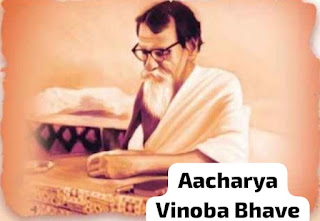Aacharya Vinoba Bhave (1895-1982) was an Indian Spiritual leader, social reformer, and advocate of non-violence.
He is best known for his Bhoodan movement, which aimed at
persuading wealthy landowners to voluntarily give away a portion of their land
to landless farmers.
 |
| Aacharya Vinoba Bhave – Short essay | Speech |
Vinoba Bhave was born in a small village in Maharashtra, India. He was deeply influenced by the teachings of Mahatma Gandhi, and he joined the Indian Independence movement at a young age. In 1940, Gandhi selected Vinoba Bhave as his spiritual heir, and he began to work closely with Gandhi on various social and political issues.
In 1951, Vinoba Bhave launched the Bhoodan (land
gift) movement, which aimed at redistributing land to the landless poor. He
would walk from village to village, asking wealthy landowners to donate a
portion of their land to the poor. This movement became very popular, and
Vinoba Bhave became known as the "walking saint."
In addition to his work with the Bhoodan
movement, Vinoba Bhave also advocated for non-violence and the eradication of
untouchability, the social practice of treating certain groups of people as
outcasts. He also wrote many books on spirituality, including his translation
of the Bhagavad Gita, a sacred Hindu text.
Vinoba Bhave was awarded the Ramon Magsaysay
Award for Community Leadership in 1958, and the Padma Vibhushan, one of India's
highest civilian honors, in 1983, after his death. His legacy continues to
inspire social reformers and spiritual seekers in India and around the world.
Here is some more information about Aacharya Vinoba Bhave:
v Vinoba Bhave was deeply influenced by the
teachings of Hinduism, Buddhism, and Jainism, and he believed in the power of
spirituality to bring about social change.
v He was a strong advocate of non-violence and
believed that it was the only way to achieve true peace and justice in the
world. He was also a vocal opponent of the caste system and worked to promote
equality and social justice.
v The Bhoodan movement that he founded became a
major social movement in India, with thousands of landowners donating land to
the poor. Vinoba Bhave also initiated a related movement called Gramdan, which
aimed at creating self-sufficient and self-governing village communities.
v Vinoba Bhave was arrested several times during
the Indian Independence movement, and he spent several years in jail. However,
he continued to work for social justice and non-violence throughout his life.
v In addition to his work with the Bhoodan and
Gramdan movements, Vinoba Bhave also played a key role in the establishment of
the Sarvodaya movement, which aimed at creating a society based on the
principles of non-violence, decentralization, and self-sufficiency.
v Vinoba Bhave's writings include translations and
commentaries on the Bhagavad Gita, the Upanishads, and other Hindu scriptures.
He also wrote several books on social and political issues, including
"Talks on the Gita", "Samagra Kranti", and "Hind
Swarajya".
v After his death, Vinoba Bhave's followers
established the Vinoba Bhave University in Hazaribagh, Jharkhand, India, as
well as several other educational and social institutions in his honor.








0 Comments